Introduction
Urban life is evolving faster than ever… and Artificial Intelligence is now at the heart of how modern smart cities operate. From intelligent traffic systems and predictive energy grids to safer streets and sustainable infrastructure, AI is transforming how cities function, grow, and serve their residents. Lets discuss how AI is transforming smart cities?
By 2050, almost 68% of the world’s population will live in cities, which means urban environments must become smarter, greener, and more efficient. AI helps city authorities analyze real-time data, optimize services, reduce waste, and improve the overall quality of life for citizens in the USA, UK, and beyond.

In this guide, we’ll explore how AI is transforming smart cities, with real-world examples, practical benefits, key challenges, and what the future may look like.
✔ Key Takeaways – How AI is Transforming Smart Cities (2025)
- AI improves traffic flow, public safety, energy efficiency, and waste management in modern cities.
- Real-world examples from major cities like London, Los Angeles, New York, and Singapore show measurable impact.
- AI supports sustainability by reducing emissions, improving transit systems, and optimizing resources.
- Key challenges include data privacy, infrastructure costs, ethics, and responsible AI governance.
- The future of smart cities includes autonomous mobility, AI-driven healthcare, and intelligent urban planning.
Table of Contents
🏙️ What Are Smart Cities?
Smart cities are urban environments that use digital technologies, IoT devices, and data analytics to improve services, enhance sustainability, and provide a better living experience for residents.
Core Characteristics of AI Is Transforming Smart Cities
- IoT-powered infrastructure for real-time monitoring and analytics
- Sustainable energy systems & eco-friendly transport
- Data-driven policy and decision-making
- Automation across public services and utilities
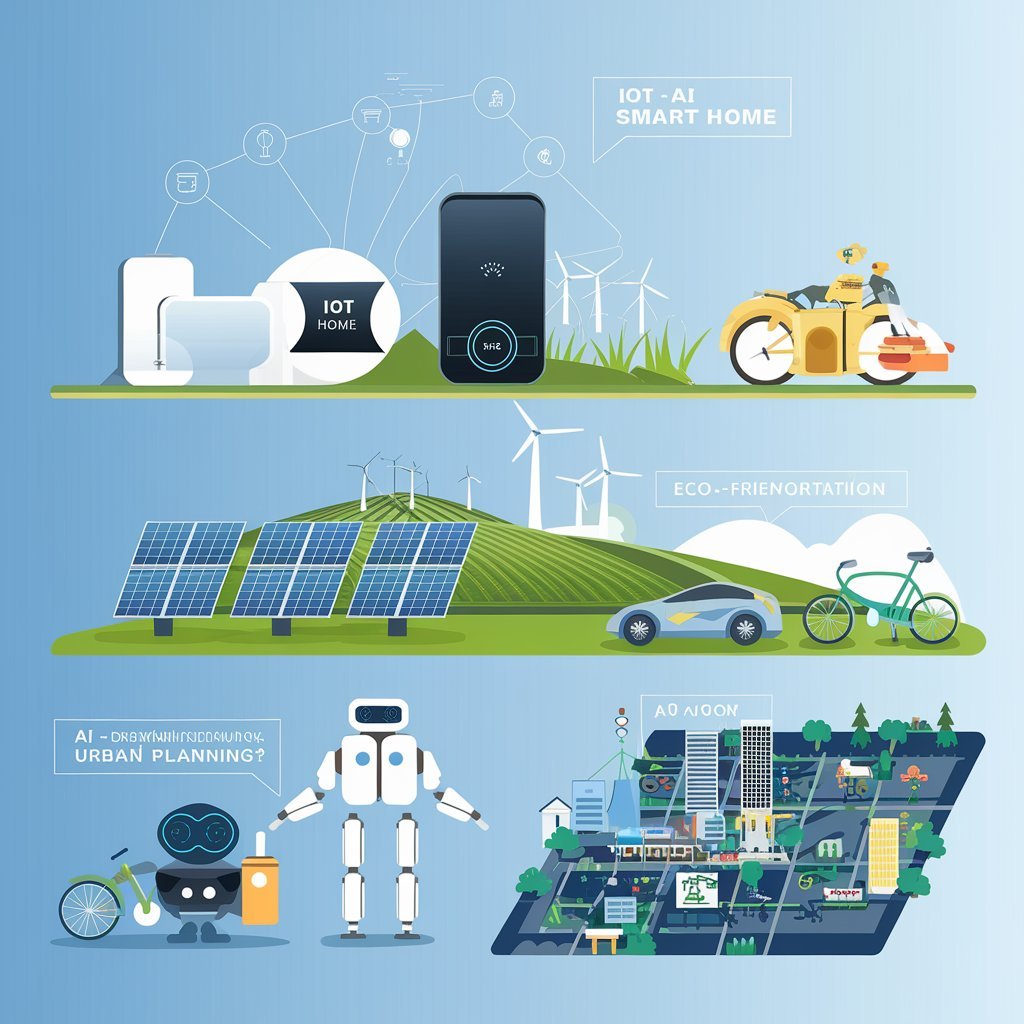
In simple words, what are smart cities? We can say these are the cities known as urban areas that utilize digital technology and data analytics. As a result, this action improves performance, enhances community experience and optimizes resource use.
Key Characteristics
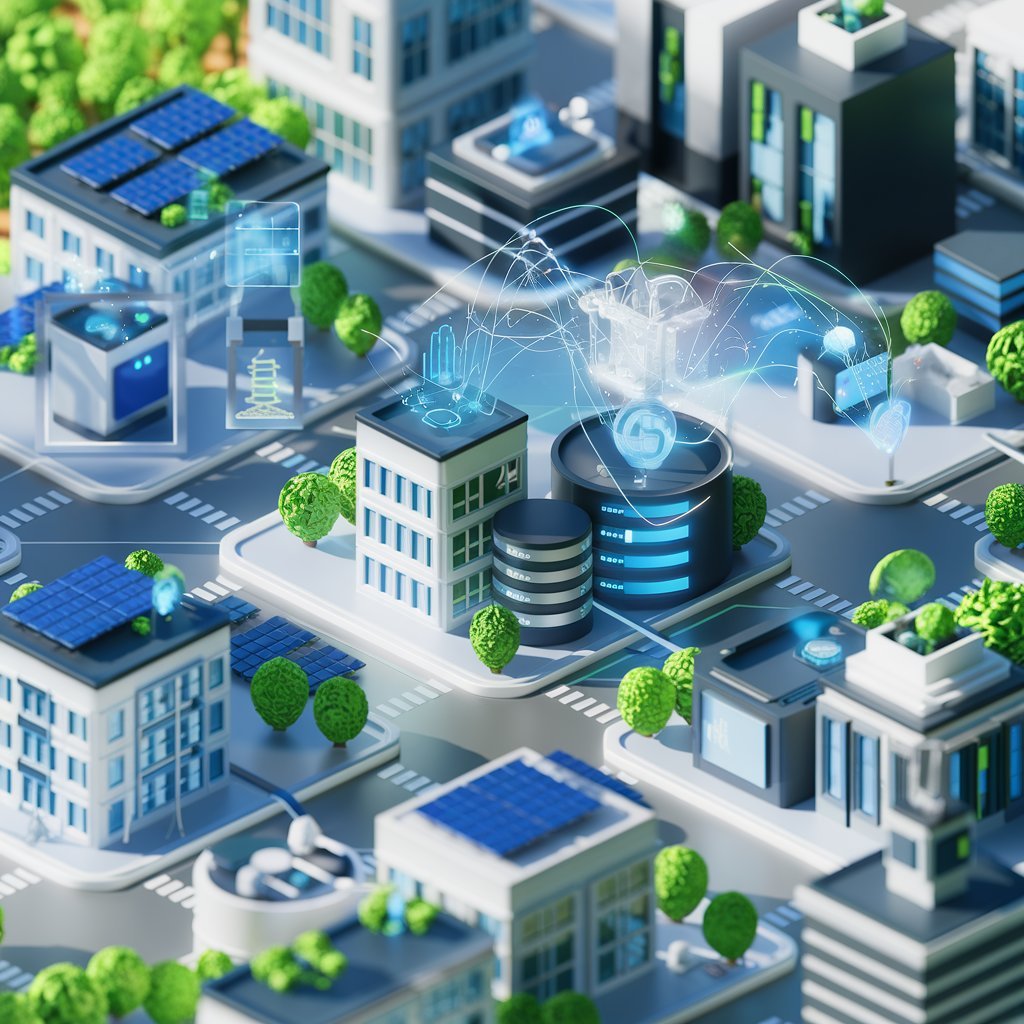
Smart cities typically exhibit the following features:
- Internet of Things (IoT): A network of interconnected devices that collect and analyze data.
- Sustainable Infrastructure: Investments in green buildings, renewable energy, and eco-friendly public transport.
- Data-Driven Decision-Making: Utilizing data analytics for city planning, traffic management, and resource allocation.
AI’s Role in Smart Cities
Nowadays, AI plays an important role in smart cities by automating different processes, resolving sets of data and ensuring real-time decision making. AI acts as the intelligence layer, analyzing data, predicting trends, automating operations, and enabling faster, smarter decisions.
🔧 How AI Is Transforming Smart Cities (Real-World Use Cases)
🏗️ Urban Planning & Infrastructure

AI-powered systems help cities forecast demand, plan utilities, and optimize construction and energy usage.
Use Case: London’s Smart Infrastructure Initiatives
We can observe and study one of the use cases of London, as London is leading the way in smart infrastructure with the utilization of AI technology. It helps to assist in urban planning and traffic management. Hence, as a result, it creates more effective transportation routes and reduces congestion.
Read more about this use case, Click Here!
London uses AI in traffic modelling and infrastructure planning, helping reduce congestion and improve transport routes.
🚦 Traffic Management & Mobility

Adaptive AI traffic systems analyse real-time data to:
- Coordinate public transport
- Reduce congestion
- Improve travel time
Use Case: AI Traffic Management in Los Angeles
One of the real use cases of AI algorithms can be observed in Los Angeles (LA) as AI algorithms are implemented to control traffic lights and enhance public transportation efficiency. Hence, as a result, this leads to smoother traffic patterns and reduces travel time as well.
Read more on this use case, Click Here!
LA’s AI-driven traffic light control system improves traffic flow and commuter efficiency, reducing delays across major intersections.
🛡️ Public Safety & Security

AI enhances city safety through:
- Crime pattern detection
- Smart surveillance analytics
- Faster emergency response
Use Case: AI-powered Surveillance in New York City
Another use case of AI-driven surveillance systems can be observed in New York City as these systems analyze video feeds to detect suspicious activities quickly. However, this helps to detect crime scenes earlier as well as optimizes police resources. This rapid action ensures the security systems on the current siltation.
AI-powered monitoring tools help detect suspicious activity in real time, improving incident response and resource allocation.
♻️ Waste Management & Sustainability

AI helps cities build greener systems with:
- Resource optimisation
- Smart waste bins & collection routing
- Automated recycling processes
Use Case: AI for Waste Management in Singapore
Singapore employs AI to optimize its waste collection and processing systems. Smart bins equipped with sensors notify waste management services when they need to be emptied, reducing unnecessary collections and improving overall efficiency.
For explore more use cases of real world problems using AI technology, read this article, CLICK HERE!
Singapore uses AI-enabled smart bins and logistics routing to reduce unnecessary collections and increase efficiency.
🌍 Benefits of AI in Smart Cities
- Greater operational efficiency
- Lower costs & predictive maintenance
- Cleaner, more sustainable environments
- Improved quality of life for residents
Improved Efficiency
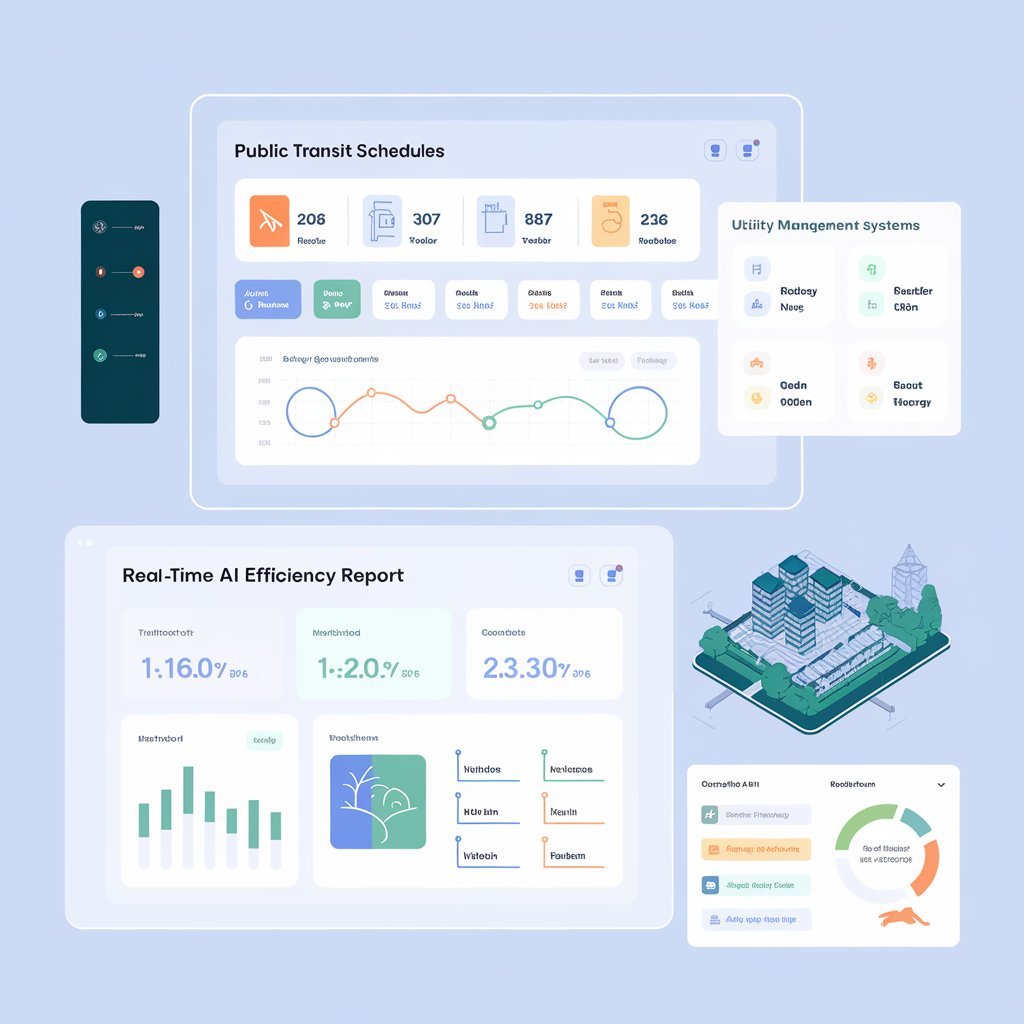
If we talk about optimization processes from public transit schedules to improving utility management, AI technology enhances the efficiency of city services.
Sustainability
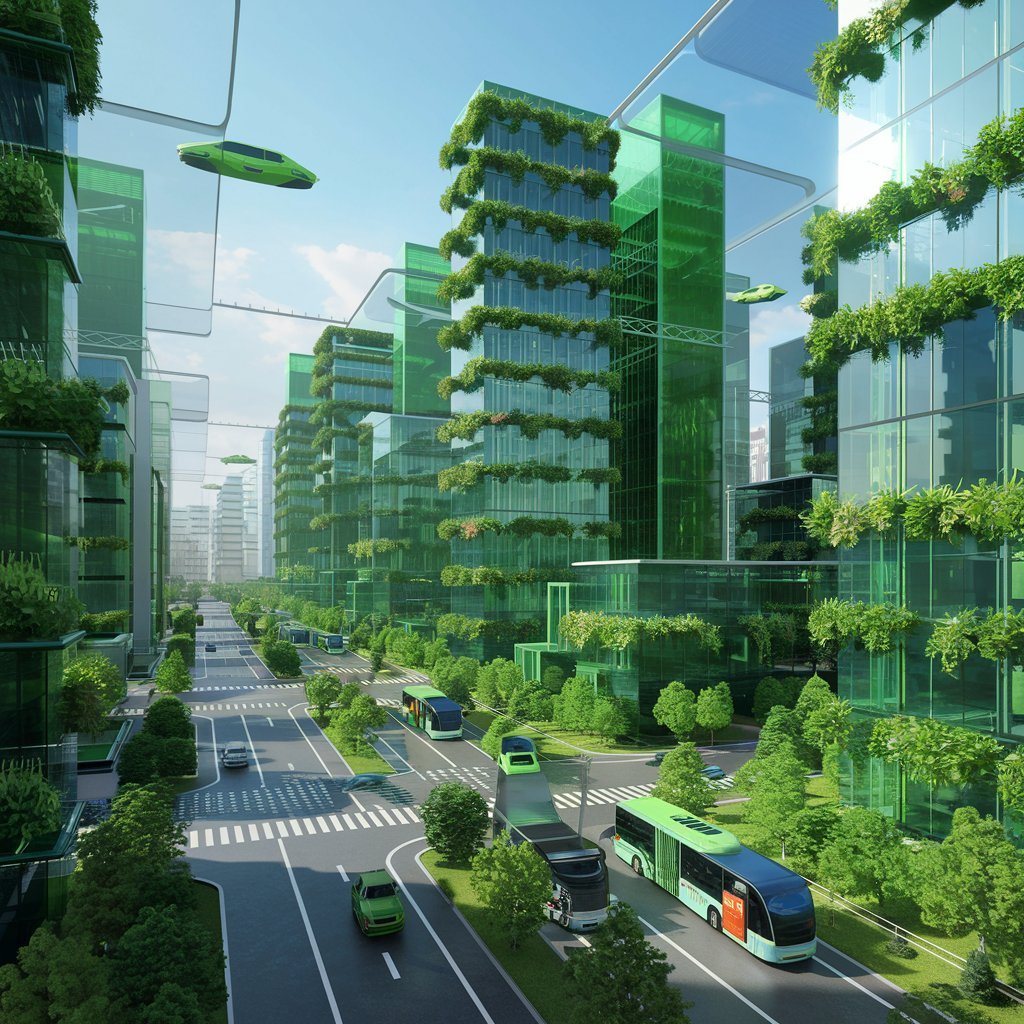
However, by supporting smart energy grids and effective waste management systems, AI promotes environmental sustainability. As a result, it leads to a significant reduction in the carbon footprint of smart cities.
Enhanced Quality of Life
By resolving traffic issues and ensuring public safety in the environment, AI-powered systems elevate the quality of life of individuals in societies.
Cost-Effectiveness
With the help of AI-driven automation and predictive maintenance, cities can achieve the benchmark of substantial savings. As a result, these steps reduce the need for costly reactive measures.
⚠️ Challenges & Ethical Considerations
Data privacy & security governance (GDPR & regional compliance)
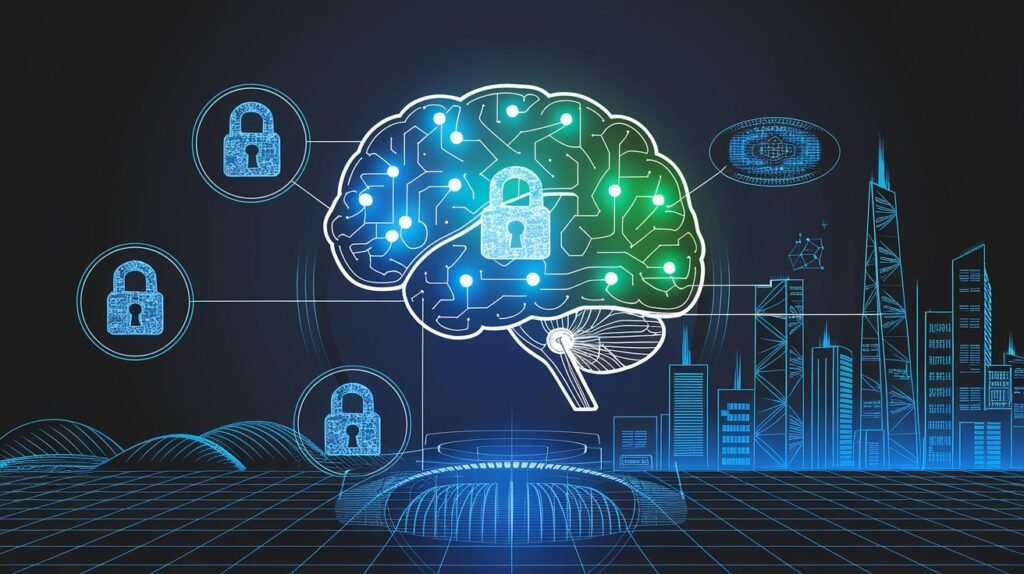
As we know, nowadays, because of the large amount of data sets and records, it raises the challenge of citizens’ privacy. It has to be ensured that cities must navigate regulations like GDPR to protect this large amount of data besides gaining valuable insights.
High infrastructure and deployment costs
There are some challenges in adopting AI in urban settings like high costs, inadequate technological infrastructure and potential public resistance to change.
Algorithmic bias & transparency concerns
There are ongoing ethical concerns regarding algorithmic biases and their impact on decision-making in urban settings. Cities must carefully consider the implications of AI on both employment and everyday life.
CLICK HERE! To read about Ethics In AI and death of Whistleblower Balaji’s story!
🔮 The Future of AI in Smart Cities (2025 & Beyond)
The next decade will bring advancements in:
- Autonomous transport systems
- AI-powered healthcare access
- Smarter homes & connected IoT ecosystems
- AI-enhanced urban resilience and climate planning
AI won’t just change infrastructure… it will reshape how communities live, move, and interact.
Predictions for 2025 and Beyond
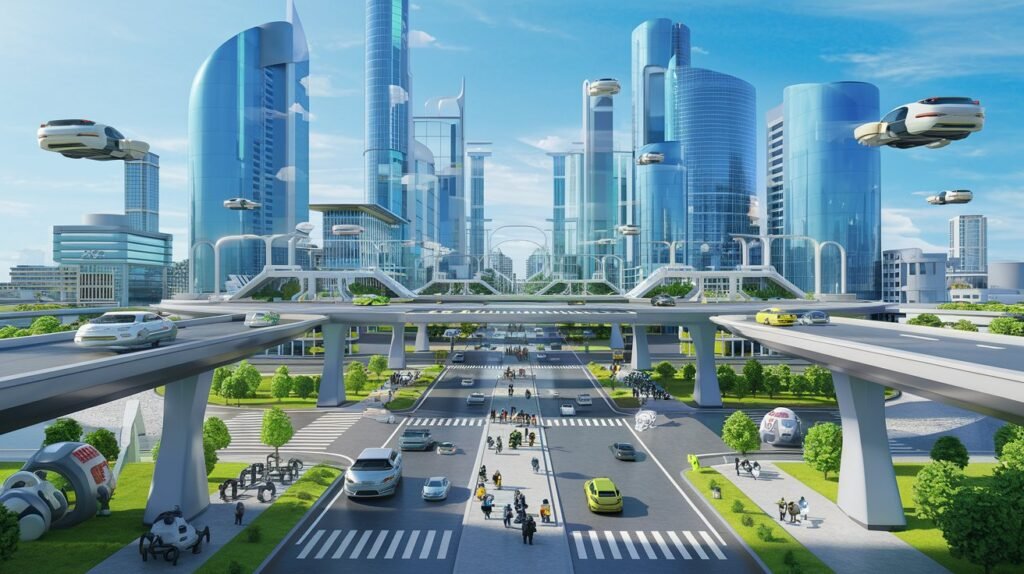
It’s the time of 2025 and as we look toward the future, AI will change and transform urban living in remarkable ways. In areas such as autonomous vehicles, AI in Healthcare and the evolution of smart homes or we can say IoTs, we can expect huge advancements gradually.
How AI Could Change the Urban Landscape
In the next decade, AI will likely reshape not only the physical infrastructure of cities but also their social fabric.
🟦 Conclusion
AI is rapidly transforming the structure and everyday experience of modern cities improving mobility, strengthening public safety, reducing environmental impact, and creating smarter, more sustainable urban ecosystems.
As AI continues to evolve, cities that adopt responsible, ethical, and citizen-focused AI strategies will lead the way in building the smart cities of the future.

Let’s join hands, be a part of our AI – The Hub’s family by just sharing this knowledgeable article with your friends & families. Don’t forget to share, like and comment below and just go through with our social media profiles of AI – The Hub.
If you found this guide helpful, feel free to share it with others, explore more AI-focused insights on AI – The Hub, and follow us on our social channels for future updates.
AI – The Hub
The Hub For Everything AI. The Future!
FAQs
What is a smart city?
A smart city uses technology, data, and automation to improve services, sustainability, and everyday urban life.
How is AI used in smart cities?
AI powers traffic systems, waste management, public safety monitoring, energy optimization, and real-time analytics.
Can AI improve traffic congestion?
Yes, adaptive AI traffic systems optimize signals and routes to reduce congestion and travel times.
How does AI support sustainability?
AI improves energy efficiency, waste processing, and emissions reduction across city services.
What are the risks of AI in smart cities?
Key risks include data privacy concerns, infrastructure costs, and ethical governance challenges.
